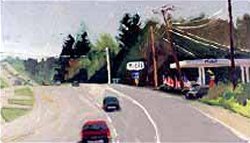A Late Phase of Modern Irony in the Paintings of James Howard Kunstler
The German literary theorist Karl Heinz Bohrer claims that modern reason forms not a unity, but rather a disjointed assemblage of aesthetics, science, and morality. It is not correct to say that for us moderns the beautiful is the same as the true. Our age, following upon the contributions made by Romanticism, cuts at the in the classical adequation of the beautiful and the true so that science, morality, and art are (as it were) separate language games speaking past each other. The space of aesthetics is thus characterized by irony, a kind of surplus of consciousness in which reason turns against itself and goes beyond simple representation of the beautiful as the true. Here, art ranges over themes other than beauty and irony, which is typically defined as the opposite of or difference between the author's meaning and the literal statement, is a recurrent theme in modernity and the art which aims to explore its complexities.
And so we have the difficult irony of James Howard Kunstler's paintings. Kunstler's writings on the imminence of peak oil have been a favorite touchstone for this blog, but his paintings have not been discussed on these pages heretofore. I have selected some representative samples made available at his website (www.kunstler.com) and shown here below. I adduce these paintings so as to discuss the particular manner in which these paintings are ironic, for the manner in which these paintings are ironic is quite instructive and original. For these are no mere examples of the kind of irony that means to express the opposite of what they show. No, Kunstler's paintings are examples of a late phase of irony that relies instead upon the literal meaning to convey their irony. They do not have an opposite or alternative to their own literal expression. They express wholly what they are. In essence, their realism is the ironic gesture.
Now, clearly these paintings are not "realist" paintings in the sense of a Rembrandt or Van Eyck, but seem to have a kind of impressionistic quality to them. At first blush, this impressionistic quality may make us think they are something of a cartoon, that their subject matter is banal to the point of being wholly without merit. And that is exactly their point. One realizes that the subject matter--cars on a road--is what is being addressed and the inexpertise of the painting reveals the inexpertise of the planning arrangement that has given rise to this form of life. Their ad hoc property is exactly what they mean to evince. That is no ordinary irony (the "opposite of the literal expression"), but speaks to the identity of the literal meaning with the expression and so forces the viewer to confront reality rather than evade it, as through an attitude of irony and removal. Here, clearly, the true is not the same as the beautiful but rather it is the true as the ugly and alienating. See for yourself:




